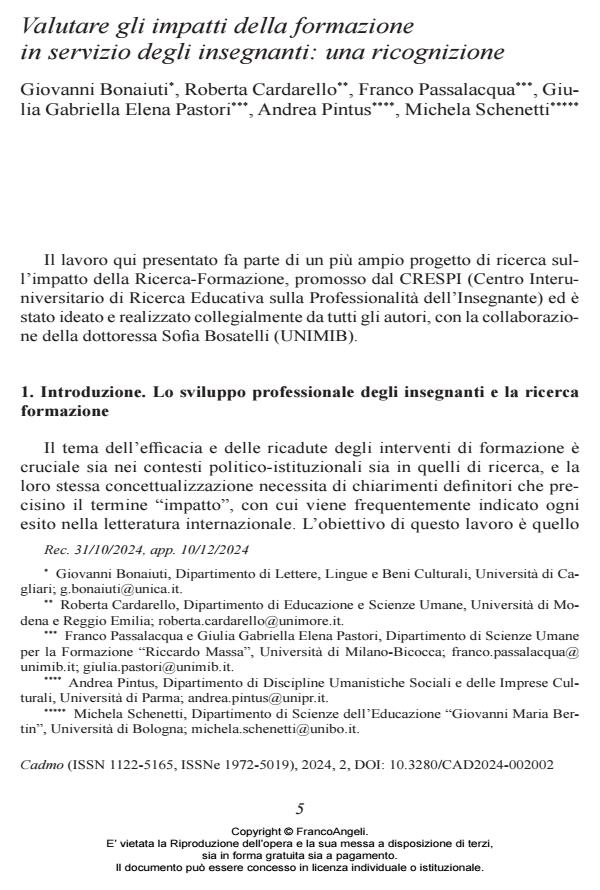Valutare gli impatti della formazione in servizio degli insegnanti: una ricognizione
Titolo Rivista CADMO
Autori/Curatori Giovanni Bonaiuti, Roberta Cardarello, Franco Passalacqua, Giulia Gabriella Elena Pastori, Andrea Pintus, Michela Schenetti
Anno di pubblicazione 2025 Fascicolo 2024/2
Lingua Italiano Numero pagine 15 P. 5-19 Dimensione file 214 KB
DOI 10.3280/CAD2024-002002
Il DOI è il codice a barre della proprietà intellettuale: per saperne di più
clicca qui
Qui sotto puoi vedere in anteprima la prima pagina di questo articolo.
Se questo articolo ti interessa, lo puoi acquistare (e scaricare in formato pdf) seguendo le facili indicazioni per acquistare il download credit. Acquista Download Credits per scaricare questo Articolo in formato PDF

FrancoAngeli è membro della Publishers International Linking Association, Inc (PILA)associazione indipendente e non profit per facilitare (attraverso i servizi tecnologici implementati da CrossRef.org) l’accesso degli studiosi ai contenuti digitali nelle pubblicazioni professionali e scientifiche
The effectiveness of in-service training and professional development interventions for teachers is a crucial topic within the field of education and educational research. This study examines the concept of “impact” and how it is understood and assessed in the literature. As part of a systematic review currently being conducted across academic databases, preliminary syntheses (meta-analyses and systematic reviews) have been extracted to determine the constructs and methodological tools used to measure impact in research on teacher training. The findings highlight a focus on assessing outcomes across a variety of levels, supporting the discussion of “impacts” of in-service training, observable through diverse methods and tools, and targeting at least three areas: teachers, students, and the broader educational context. This study thus provides a comprehensive synthesis that may inform educational policies, continuous training practices, and educational research in the field.
Parole chiave:teachers, in-service training, professional development, impact. systematic review.
Giovanni Bonaiuti, Roberta Cardarello, Franco Passalacqua, Giulia Gabriella Elena Pastori, Andrea Pintus, Michela Schenetti, Valutare gli impatti della formazione in servizio degli insegnanti: una ricognizione in "CADMO" 2/2024, pp 5-19, DOI: 10.3280/CAD2024-002002